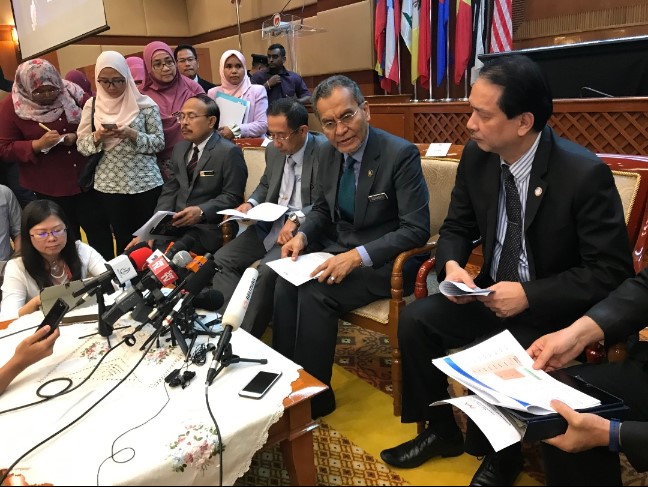PUTRAJAYA, Dec 9 — A Malaysian baby with polio previously received a dose of the polio vaccine, but fell ill before the second dose could be administered, health officials said today.
The three-month-old infant from Tuaran, Sabah, was the first reported polio case in Malaysia 27 years after the last case in 1992, and 19 years after Malaysia was declared polio-free in 2000.
“This is the challenge — even though he was vaccinated, in this situation a patient (was) susceptible… for whatever reason… (due to) immuno-compromise (sic), health and so on,” Health Minister Dzulkefly Ahmad said.
He also stressed that the inactivated polio vaccine did not cause the vaccine-derived poliovirus (VDPV) and that the VDPV found in the Sabahan case was not due to the polio vaccine.
Speaking at the sidelines of a Ministry of Health (MOH) event here, the health minister said there is no cause for alarm now, but intensified efforts are ongoing to ensure that routine screening and polio vaccination is administered.
He added that while the infant boy’s case is the first reported almost three decades after the last reported polio case in Malaysia in 1992, MOH is on the lookout for anyone with polio symptoms and will investigate all cases.
Investigations entail testing two stool samples from symptomatic children — including those who have Acute Flaccid Paralysis (AFP), which shares features of polio — within 14 days of the occurrence of paralysis at a local World Health Organisation-accredited lab to confirm the presence of polio. AFP is paralysis of limbs that can indicate polio.
Polio, which mainly affects children below five years of age, invades the nervous system and can cause total paralysis in hours. There is no cure for polio, but it can be prevented with polio vaccine immunisation.
The infant boy was confirmed last Friday to be infected with vaccine-derived poliovirus type 1 (VDPV1), Health director-general Dr Noor Hisham Abdullah said in a statement yesterday.
Tests showed the boy was infected with a polio strain that shared genetic links with the virus detected in the Philippine cases, which reported its first cases of polio since 1993 in September.
The infant boy, who is currently in intensive care at a hospital, has no history of travelling, Dzulkefly said today, adding that how the Filipino strain came to be in the child’s system is “anybody’s guess”.
Dr Chong Chee Kheong, MOH deputy director-general of health (public health), meanwhile, told reporters today that MOH will now be focusing efforts in the Tuaran village where the case was detected.
“We have started action and we have covered all the houses there, roughly about 100… and about 650 (people who make up the) population,” he said. This entails checking for signs of symptoms and contact with polio patients.
Dr Chong said all children under the age of 15 in that Sabah village have been vaccinated. Now, other high-risk areas in Sabah will be identified, where their vaccination status will be determined and vaccination provided, following which vaccination would be provided for that part of the state if there is a need for it.
Continuous surveillance of polio in the environment is also being done through sewage sampling at six water treatment plants in Sabah, although no wild or vaccine-derived polio virus have been found in any environmental sample.
All polio cases reported in Malaysia is due to wild poliovirus, the last case of which was reported in 1992.
MOH, meanwhile, advised parents to carry out routine immunisation — which is three doses of polio vaccination during a child’s early stage of life.
“Protection after the first dose is not very good, maybe 30 to 60 per cent (successful) but it’s not very good. But after the second dose (is administered), it’s good protection: 60 to 80 and after third dose, it is… close to 100 per cent,” said Dr Chong.
As of December 7, 12.3 per cent of children aged between two months and 15 years living in the area of the polio patient in Sabah, or 25 out of 205 people, did not receive the polio vaccine. All of them are non-Malaysians, and were subsequently vaccinated.
Dzulkefly today also reiterated that the MOH’s stance is that all patients who come to MOH health care facilities — be they stateless or undocumented — will be able to receive treatment and vaccination.
The vaccination programme in Malaysia is free of charge at all government health care facilities for Malaysians, while a nominal fee is charged for non-Malaysians.








